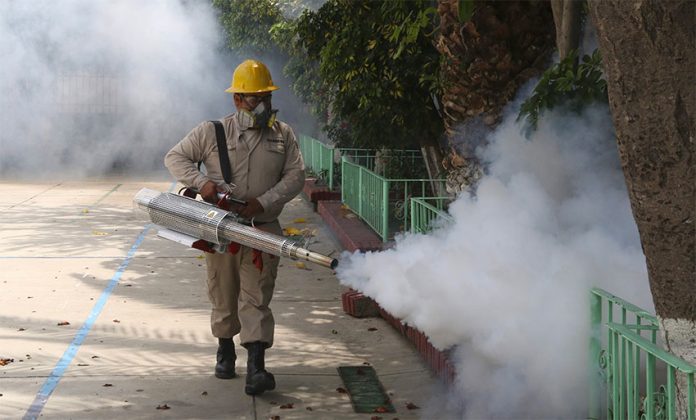There were more than 16,000 confirmed cases of dengue fever in 16 states during the first eight and a half months of the year, more than triple the number reported in the same period of 2018.
The epidemiology department of the federal Health Secretariat said there were 100,510 probable cases of the mosquito-borne tropical disease to September 15, of which 16,410 cases are confirmed.
To the same date last year, there were 4,578 confirmed cases of dengue.
With 4,845 cases, Veracruz has seen the biggest outbreak of the disease that is also known as breakbone fever. Only 807 cases were reported between January and September last year.
Higher numbers have also been seen in Jalisco, Chiapas, Oaxaca and Puebla.
ACAPS, a Switzerland-based independent information provider that carried out an analysis of the disease in Mexico this year, said in a September 16 briefing note that “the ongoing rainy season, which lasts until October, could continue to increase caseloads of dengue both within Veracruz and across the country.”
In Veracruz, all four serotypes of dengue have been detected, ACAPS said, adding that “the deadliest strain of dengue, serotype-2 . . . could lead to more severe reactions to the disease.”
There have been more than 900 confirmed cases of “severe” dengue this year and deaths have been reported in both Veracruz and Oaxaca.
In the Isthmus of Tehuantepec region of the latter state, a five-year-old boy died of dengue in late July while his sister is believed to have succumbed to the same disease in June although her death was officially attributed to appendicitis.
The federal health secretary said earlier this month that 120 people have died from dengue this year, but the Directorate General of Epidemiology says only 43 have been confirmed.
ACAPS cited a range of factors that could affect the capacity of Mexico, and Veracruz in particular, to respond to the high number of dengue cases.
It noted that 20% of people in Veracruz don’t have either public or private health insurance, adding that “the gap in health care coverage may lead to difficulty in accessing necessary treatment for some of the population.”
The NGO also said that gang violence may pose security risks in that it could prevent access to healthcare.
ACAPS also cited three “aggravating factors” that could make the dengue situation worse in Veracruz: climate, lack of insecticides and other diseases.
Heavy rains could increase the presence of standing water and thus facilitate the breeding of mosquitoes, ACAPS said.
It also said that the lack of insecticides available in Veracruz has been cited as one of the reasons for the higher than average level of cases so far in 2019 and that other viruses and diseases currently present could impact the ability of healthcare facilities to respond to the dengue outbreak.
Earlier this month, it was revealed that federal health authorities didn’t spend a single peso on insecticides until early August.
However, Dr. Ruy López Ridaura, director of the National Center for Disease Prevention and Control Programs, said that mosquito spraying had occurred throughout the whole year in parts of the country susceptible to dengue outbreaks, explaining that state authorities used their own funds to purchase insecticides.
He also said that spike in the number of cases this year was not abnormal or alarming.
On September 5, health undersecretary Hugo López-Gatell accused insecticide vendors of conducting a disinformation campaign that links this year’s outbreak of dengue fever to the federal government’s later than usual purchase of the product.
Source: El Universal (sp)
